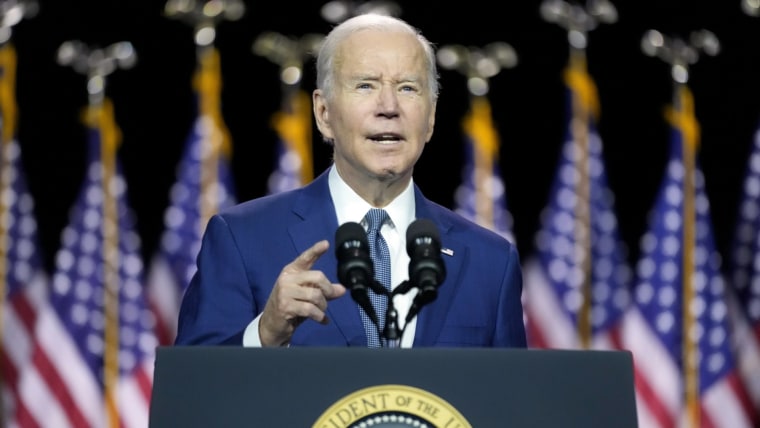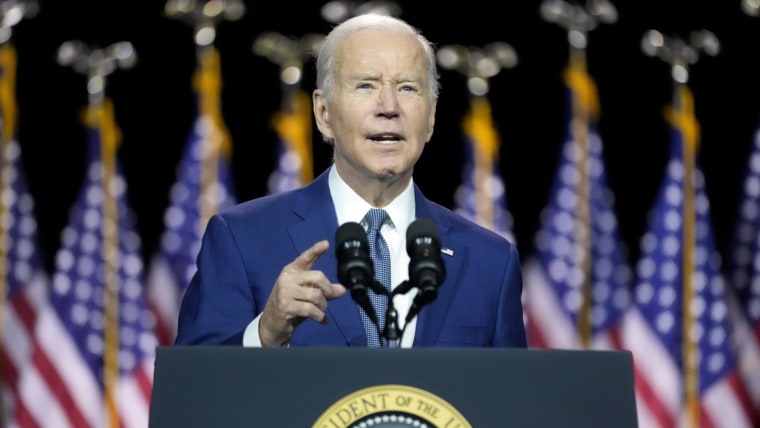WASHINGTON — A mass shooting in Allen, Texas, and another in Cleveland, Texas. The first-ever indictment of a former president, followed by a sex abuse verdict, followed by the indictment of a sitting congressman. Fighter jets shooting down UFOs over North America. War in Ukraine. Threats of war in Asia. A flood of migrants crossing the southern border. Actual floods in California.
And now a new calamity. A nation that has been deluged with head-spinning news day after day is faced with a budgetary impasse that could set off a recession or worse.
A divided Congress has only about three weeks to raise the country’s borrowing limit and thereby keep America from defaulting on its debts. Default has never happened before and could push the U.S. and global economy into harrowing territory, economists say. But for many Americans, that scenario remains an abstraction far removed from day-to-day concerns. And there are signs that a crisis-weary population wants to sit this one out.
A recent focus group convened by the research firm Engagious asked 11 Georgia voters who backed President Joe Biden in 2020 if they worried that the government would blow through a looming deadline and default on its debt. Not one hand went up. Corporate America has largely sidestepped the contentious debate unfolding in Washington.
Tom Daschle, the former Senate Democratic leader, said he was recently briefed on a private poll that showed most of the people surveyed were “skeptical” of the doomsday scenarios. Even those who grasped the potential consequences believed that the two sides would eventually cut a deal staving off default.
“Global investors and Americans more generally appear largely unruffled by the fast-approaching X-date,” said Mark Zandi, the chief economist of Moody’s Analytics and a veteran of Washington spending wars, referring to the date in early June when the Treasury Department forecasts it won’t be able to pay the bills. “The stock market remains firm as does the value of the U.S. dollar and much of the bond market. I suspect the key reason for the blasé attitude toward the debt limit is everyone thinks they’ve seen this movie before many times over the years and now know the ending.”
The problem, though, is that while panic is counterproductive in most crises, it may be necessary to resolve this one by putting pressure on elected officials to compromise and avert disaster.
“That financial markets are calm raises the odds that lawmakers won’t act in time, as it likely will take some turmoil in markets to generate the political will necessary to get lawmakers to act,” Zandi said.
A standoff over the debt ceiling in 2011 offers an illustration of both the costs of brinksmanship and a president’s power to enlist the public to reach a compromise. Then-President Barack Obama delivered a rare prime-time speech about one week before the government would have breached the debt ceiling. He urged Americans to call Congress and “make your voice heard.” The public’s response was enthusiastic enough to crash the websites of congressional leaders.
Obama and Republican lawmakers struck a deal days later. They averted default, but considerable damage was inflicted anyway. A Treasury Department report in 2013 — amid yet another debt ceiling debate — concluded that the impasse in 2011 harmed job growth, roiled financial markets and lowered consumer and business confidence.
So far, Biden has given no such prime-time speech. The markets, until now, have mostly shrugged. Google Trends data show far fewer internet searches for terms like “debt ceiling” than in 2013. And the three major cable news channels have mentioned the debt ceiling only a third as much as they did in 2013, according to an analysis prepared for NBC News by Media Matters.
Inside the White House, advisers believe there is still enough time to strike a deal with Republicans and avert disaster. Biden is steadily ratcheting up the pressure on Republicans where they live, traveling recently to a New York swing district represented by a Republican.
“We’ve not reached the crunch point yet,” Biden told reporters on Saturday.
A fresh piece of economic data suggests that the awakening may have begun. A report released Friday by the University of Michigan shows that consumer sentiment is falling “alongside the proliferation of negative news about the economy, including the debt crisis standoff.”
In the coming days, Biden will take more questions from the press about the debt ceiling, “Which is a way of helping break through,” a White House aide said.
The White House has also expanded its communications team, tapping Rob Friedlander of the Office of Management and Budget to help explain and lay out its position on the debt ceiling.
“A big part of this is making it clear to the American people what the stakes are so they can communicate that to their representatives” in Congress, the White House aide continued, speaking on condition of anonymity to discuss the White House’s strategy.
The attention paid to the debt ceiling crisis in the Obama era may have been a product of a simpler political time, when a near-existential threat to the nation was an anomaly, not another Thursday. Donald Trump was a reality TV show host, social media was still a novelty and a congressman yelling “you lie” at the president seemed like a really big deal.
“We all have shorter attention spans and crisis fatigue,” said Dan Pfeiffer, who was a top communications official in the Obama White House during those earlier fights.
Like Marvel Studios struggling to keep audiences engaged after they’ve seen the universe saved from the brink of destruction 32 times, a partisan congressional fight just doesn’t have the same draw, however grave the stakes.
“Because default was avoided the last two times, there seems to be an assumption from a lot of people and the markets that it will be avoided again,” Pfeiffer said. “That is a deeply naive view in my opinion.”
Both sides are holding out, convinced the other will cave once the pressure is on. But what if pressure never builds because the public and the markets aren’t paying attention?
In the focus group of 11 Georgia voters, the moderator asked how many had followed news about the debt ceiling fight. Only four raised their hands.
Zandi said he believes that public unease will inevitably kick in. “I suspect markets will be calm until they are not. That is, the blasé attitude toward the debt limit will quickly give way to panicked concern literally between one day and the next at some point in the next few weeks,” he said.
Absent pressure from their constituents, Republicans in Congress have space to stake out a maximalist position and insist on sweeping budget cuts in return for raising the debt ceiling.
And the most powerful voice in the party, Trump, is egging them on.
“I say to the Republicans out there — congressmen, senators — if they don’t give you massive cuts, you’re going to have to do a default,” Trump, the front-runner for the GOP nomination, said at a CNN town hall Wednesday night.
He dismissed a default as “really psychological more than anything else.”
If people have followed the issue at all, they’ve concluded that this is simply one more partisan fight in Washington that reinforces perceptions of broader dysfunction, political analysts from both parties said.
The White House’s belief is that Biden will escape blame if negotiations collapse and that voters will conclude congressional Republicans are at fault. That may be overly optimistic. If the debt ceiling isn’t raised and the worst forecasts come true — stock markets collapse and jobs disappear — people will blame whoever is in charge, starting with Biden, some analysts said.
A former Obama campaign adviser said that inside the Biden White House, some aides are viewing the budget standoff with “unrealism.”
“There are people there who are saying, ‘Oh, people always blame the Republicans because they know the Republicans are crazy,” this person said, speaking on condition of anonymity to talk freely. “Whereas I believe the blame is more even, or even tilted toward the president.”
It would be a mistake for the White House to assume voters will parse the varying levels of responsibility should default take place, analysts said.
“The American public is not going to follow the ins and outs of how the debt negotiations went south,” said Sarah Longwell, who conducts regular focus groups with voters and who publishes the conservative website The Bulwark. Everyday voters, she said, “are going to blame the people in charge because that’s what people do. They’re going to blame him [Biden] because they’re not following it closely. They’re going to blame the people in charge.”
Some voters may not fully understand the distinction between a government shutdown — something that is comparatively limited and now somewhat routine — and an unprecedented default, which could drive up interest rates on home mortgages and credit cards, and raise the unemployment rate by as much as 5 percentage points.
Controlling a formidable megaphone, Biden is positioned to convey the enormous stakes involved and influence public opinion. But he has much work to do on that front, analysts said.
“Right now, the communication [from the White House] has not been commensurate with the cataclysmic nature of the consequences should this go off the rails,” Longwell said. “People view this as a Washington process story that they’re not focused on.”
If Biden “wants people to focus on it, and he wants to push Republicans on it, then he is going to have to go into overdrive on communicating with people on the personal consequences” of a default, Longwell said.
An open question is whether Biden can sell the public on the dangers that await: Will Americans listen, as they did when Obama beseeched them to call Congress? Biden’s job approval rating averages 42 percent, according to Real Clear Politics. That’s the same as Obama’s when he delivered his primetime speech on the debt ceiling, Gallup surveys show.
“As a partisan conservative, I would say he [Biden] has been a pretty effective president,” said Joe Walsh, a former Republican congressman from Illinois. “He’s just a s— communicator. He just cannot communicate forcefully enough and that’s really lacking right now, big time. There’s been zero sense of urgency on his part.”
Source: | This article originally belongs to Nbcnews.com











